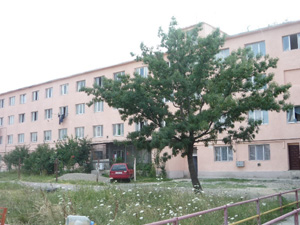Manon Bokuchava, Kvemo Kartli
The four storied building of IDPs at #6 Lomuri St has just been restored. The doors and windows have been replaced, the building has been cosmetically repaired, and individual bathrooms have been provided. Even an amusement park for children has been arranged in the yard. The building has been painted in pink, and briefly, we can say that the IDPs were provided with human living conditions. However, there just one little thing that was not considered, and as a result, nearly a half meter of water floods the basement of the renewed building.
“It’s been almost 18 years I’ve been living here. This water has been leaking for last 10 years. When it rains, the water level raises so much that it reaches the first floor of the building. Consequently flooring is almost rotted out. It is because of dampness, the linen is constantly wet all year around. The terrible smell of the stagnant and murky water is literally killing us. To add injury to insult, the malodorous smell coming from the newly changed sewerage pipes add on to it, and it does not smell good. What was the purpose of the restoration of this building, when the existing basement problem was not resolved in the first place?!” asks Zoia Janjgava, an IDP from Abkhazia.
A total of 22 IDPs are warehoused in this building. They assisted the Human Rights Centre in getting a closer look at the problem and some photos speak louder than words. The IDPs even tossed stones in the water to highlight just how serious was the water problem.
“Today or tomorrow the foundation of the building will soon be destroyed. When NGOs came to conduct reconstruction, we asked for the restoration of the basement in the first place. We were told that they would do it. It’s been like this for ten years now. The mosquitoes are big problem considering the danger that they can bring from the water mixed with sewerage,” says IDP from Ochamchire, Lela Gamisonia.
The building in which this lady lives, has been restored by “International Help and Development Agency” (IRD) and funded by the United States Agency for International Development. The agency officials are not denying the fact that the Lomouri #6 basement situation is so severe, and instead want to pass the blame to Rustavi mayor Mamuka Chikovani.
“Unfortunately, our project didn’t cover the repair of the basement,’ under the US government funded project Adding, “Only the works for which money was provided was constructed. Regardless, our organization is interested in helping to the problem faced by IDPs. Together with UN representatives we met with Rustavi mayor, Mamuuka Chikovani and he promised that the basement problem will be solved by the end of summer,” – explained the manager of IRD Purchase and Contract Department.
Considering that despite this verbal promise City Hall never really helped the IDPs, we tried to address Rustavi City Hall for explanations.
“Mr. Mamuka is aware of this problem. He’s saying that he’ll solve it right when they receive money in the budget. So, this topic is on the agenda,” – states Rustavi City Hall press service supervisor Salome Kirkelidze.
In a conversation with her, we could not ascertain when “this money shows up.” Rustavi city government doesn’t have an explanation on this topic yet.
It would appear that correct monitoring and evaluating was never carried out in this project. Simply passing the blame back to locals does not resolve the problem. Many questions are raised by this unfortunate situation, as if funds are being properly utilize, even possible corruption, and what would be the reaction if the providers of such assistance to assist IDPs.
The American people, US taxpayers would know how effectively their money is being used – and whether or not is being squandered for short term financial gain by so-called development agencies. It will be interested to know where this story leads, and if anyone will accept responsibility in the end in solving the problem. Money should never have been paid for the work completed if it was not done to standard and sustainable over the long term. It appears that there is a shortage of commonsense in this matter, and that is something that is in short supply in making assistance to Georgia effective.
News
December 13, 2023
Ethnic minorities outside the peace dialogue
November 6, 2023
‘Peace’ agenda of political parties
Popular
Articles
February 13, 2024




